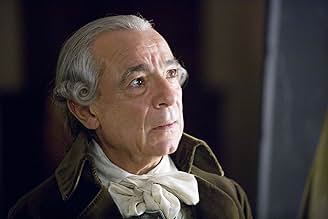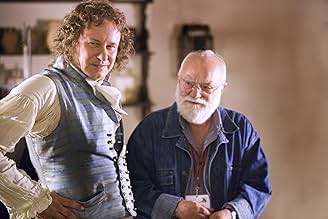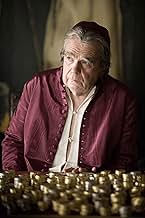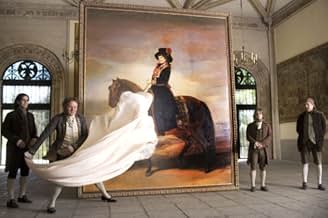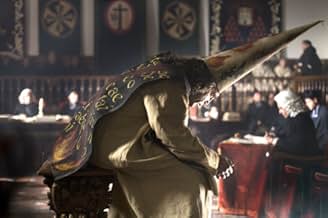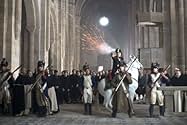Painter Francisco Goya faces a scandal involving his muse, who is labeled a heretic by a monk.Painter Francisco Goya faces a scandal involving his muse, who is labeled a heretic by a monk.Painter Francisco Goya faces a scandal involving his muse, who is labeled a heretic by a monk.
- Director
- Writers
- Stars
- Awards
- 2 wins & 5 nominations total
- Director
- Writers
- All cast & crew
- Production, box office & more at IMDbPro
Featured reviews
Imagine the paintings and drawings of Goya in all their darkness and beauty coming to life - this is Milos Forman's masterful film. Goya (and us)witness the folly of the Spanish royal court, the murderous sadistic perversion of the Catholic Church, the cruel inhumane madness of the Napoleonic War, along with the sensuality and beauty of life passing. This is the film's main focus: to let us experience the time and place as if seen through Francisco de Goya's eyes. As expected of a Milos Forman's film, the locales, the customs, and the overall production replicates the Spain of the late 18th century and early 19th century with the exactitude of a court painting. The cast is also excellent. As an Inquisitor turned a Napoleon's officer, Javier Bardem deserves another Oscar nomination. Stellan Skargsdar as usual does a chameleon-like transformation this time into Goya. Natalie Portman elevates herself into a higher realm of acting as the doomed, beautiful Ines. And Randy Quaid steals the screen for a few seconds as the King. Milos Forman again has given us an emotionally- and intellectually-challenging portrait of a dark era and the role of art and artist. Although some of the dramatization is slightly contrived, the film is compelling and moving and its vision lingers as Goya's art.
The story of the Spanish Inquisition,Napoleanic Wars, a monk and a merchant's daughter and how they affected Francisco Goya.
The movie's plot is complicated,perhaps too complicated, filled with turns and changes its trajectory just when you think it's going one way. You could say that though the story is told from Goya's(Sarsgard) perspective and is primarily advanced by what happens to Ines(Portman) the main character is Lorenzo(Bardem). Its how Lorenzo deals with these situations and how he affects the others that is key. The movie was released a year before No Country For Old Men but Bardem still brings much of the evil and menace he did to Anton Chigurh to this role. However, his role in this film,Lorenzo, is very different and not a deranged killer but more of a scoundrel who carefully picks his tune according to who's in power. Natalie Portman gives a strong performance or performances I should say as she plays two characters. I found this to be distracting as nobody is so identical to their parents but the film is a fictional story.
The film is filled with irony and sardonic moments such as how the Inquistor General sentences Lorenzo to death, then Lorenzo comes to power and orders him to the same fate and ultimately the Inquistor General is restored to power and orders Lorenzo's execution which is carried out successfully this time. Or the ending shot of Lorenzo's dead body being carted off with an insane Ines walking beside carrying an orphaned baby and holding his hand.
The film was written and directed by Milos Forman and not though it isn't of the quality One Flew Over The Cuckoo's Nest or Amadeus it is certainly entertaining and powerful.
The movie's plot is complicated,perhaps too complicated, filled with turns and changes its trajectory just when you think it's going one way. You could say that though the story is told from Goya's(Sarsgard) perspective and is primarily advanced by what happens to Ines(Portman) the main character is Lorenzo(Bardem). Its how Lorenzo deals with these situations and how he affects the others that is key. The movie was released a year before No Country For Old Men but Bardem still brings much of the evil and menace he did to Anton Chigurh to this role. However, his role in this film,Lorenzo, is very different and not a deranged killer but more of a scoundrel who carefully picks his tune according to who's in power. Natalie Portman gives a strong performance or performances I should say as she plays two characters. I found this to be distracting as nobody is so identical to their parents but the film is a fictional story.
The film is filled with irony and sardonic moments such as how the Inquistor General sentences Lorenzo to death, then Lorenzo comes to power and orders him to the same fate and ultimately the Inquistor General is restored to power and orders Lorenzo's execution which is carried out successfully this time. Or the ending shot of Lorenzo's dead body being carted off with an insane Ines walking beside carrying an orphaned baby and holding his hand.
The film was written and directed by Milos Forman and not though it isn't of the quality One Flew Over The Cuckoo's Nest or Amadeus it is certainly entertaining and powerful.
A film by Milos Forman is always an event. This will probably not remain as one of the best in his career, and was surrounded by a level of controversy, not the least among critics who received it very differently. Yet, it is certainly a film to watch.
The story actually does not have Goya (Stellan Skarsgård) in the center. It is rather the story of a corrupt morality policeman of the 18th century (Javier Bardem) imprisoning a young girl (Natalie Portman) on the unjust suspicion of practicing Judaism in secret. It is the story of a police state built on social injustice relying on pretended moral puritanism in order to save the system. This happens at the price of huge human suffering like the drama in the center of the story, and here is the painter as a witness, living the dilemma of becoming involved as a human or remaining a witness as an artist. We know what path Goya chose.
I was not unhappy neither with the acting, nor with the story line, although it is a little bit too melo-dramatic and too much prone to coincidences. Forman is not so much focused on the drama or better say melo-drama, or even in the historical detail, although he seems to be on familiar ground getting back to the period in 'Amadeus'. What he is busy with seems to be more re-creating some of Goya's paintings and prints and tracing back the origin of inspiration of these masterpieces. In a way the film can be read as justification of the choice Goya made in life.
The story actually does not have Goya (Stellan Skarsgård) in the center. It is rather the story of a corrupt morality policeman of the 18th century (Javier Bardem) imprisoning a young girl (Natalie Portman) on the unjust suspicion of practicing Judaism in secret. It is the story of a police state built on social injustice relying on pretended moral puritanism in order to save the system. This happens at the price of huge human suffering like the drama in the center of the story, and here is the painter as a witness, living the dilemma of becoming involved as a human or remaining a witness as an artist. We know what path Goya chose.
I was not unhappy neither with the acting, nor with the story line, although it is a little bit too melo-dramatic and too much prone to coincidences. Forman is not so much focused on the drama or better say melo-drama, or even in the historical detail, although he seems to be on familiar ground getting back to the period in 'Amadeus'. What he is busy with seems to be more re-creating some of Goya's paintings and prints and tracing back the origin of inspiration of these masterpieces. In a way the film can be read as justification of the choice Goya made in life.
It's 1792 Madrid. The Inquisition is interested in painter Francisco Goya (Stellan Skarsgård)'s provocative art. Luckily for him, brother Lorenzo Casamares (Javier Bardem) is his supportive patron. Inés Bilbatúa (Natalie Portman) is brought into the Inquisition for not eating pork. She is accused of being a Judaiser and put into a stress position called The Question. Her rich merchant father asks Goya to invite Lorenzo for dinner. He in turn puts Lorenzo into The Question to coerce an outlandish confession. He blackmails Lorenzo to help get Inés released.
The first hour is terrific. It has dark and tense turns. The characters are great. It builds up a compelling drama. The first problem starts with the family letting Goya leave as they torture Lorenzo. He could easily have gone to the authorities. It's a small logic break but then the story expands in scope and out of shape. This could have been a great movie if it stayed small. Milos Forman goes crazy and then the French invades. The second half is more convoluted and there are too many convenient turns. By way of explaining, I almost half-believed in this as a real Goya story. Granted, I don't know anything about the artist but these characters seem real enough. By the second half, there is no chance that this is anywhere near reality. This is half of a great movie.
The first hour is terrific. It has dark and tense turns. The characters are great. It builds up a compelling drama. The first problem starts with the family letting Goya leave as they torture Lorenzo. He could easily have gone to the authorities. It's a small logic break but then the story expands in scope and out of shape. This could have been a great movie if it stayed small. Milos Forman goes crazy and then the French invades. The second half is more convoluted and there are too many convenient turns. By way of explaining, I almost half-believed in this as a real Goya story. Granted, I don't know anything about the artist but these characters seem real enough. By the second half, there is no chance that this is anywhere near reality. This is half of a great movie.
I think Goya is after all just a pretext. What Forman wanted to talk about is how people are overwhelmed by history. It's a difficult idea to be grasped for people who live in wealthy societies where nothing much happens and the biggest problems are having more money than you already have and what to do on Saturday night. But Forman manages to show you how you can be powerless and doomed when history moves fast--too fast. The real protagonist of the story is not the painter, but the former Dominican priest, whose life is totally changed--and ultimately destroyed--by the big historical events (the French Revolution, the French invasion of Spain, the English invasion of Spain, the Restoration). The same may be said for the other characters in the story. Goya is there as a witness, and as the symbolic figure of the artist who manages to create something even out of utter destruction. One could say that Goya's Ghosts are exactly those people and events Goya witnessed and can't get rid of, so that he has to turn them into drawings and paintings; but the term "ghost" also refers to what individuals are like in those moments when everything is changing and moving towards God knows what goal. The priest and the young girl and all the other people in the story are just pawns of history, who strut and fret on the stage and then disappear. Ghosts, because they can be annihilated in any moment. It's a sad truth, but it's truth, notwithstanding Hollywood's mythologies of super-heroes that can win against all odds. Joyce said that history is a nightmare one tries to wake up from; Forman showed us the nightmare, and the last nightmarish scene of this movie is one of those you can't forget.
Did you know
- TriviaWhen asked why a film about such a quintessentially Spanish artist was made in English, the director replied "I don't speak Spanish."
- GoofsWhen Goya unveils the unflattering portrait of the queen, she is deeply offended. Actually, queen Maria Louisa liked that portrait so much that she made Goya the first court painter.
- Quotes
[Bonaparte and Lorenzo are looking at paintings of Maria Luisa]
Joseph Bonaparte: I met her once... don't recall her being quite so ugly though. How did she have so many lovers?
Brother Lorenzo: [smiling] She was the Queen, Your Majesty.
- How long is Goya's Ghosts?Powered by Alexa
Details
Box office
- Budget
- $50,000,000 (estimated)
- Gross US & Canada
- $1,000,626
- Opening weekend US & Canada
- $159,671
- Jul 22, 2007
- Gross worldwide
- $9,448,082
- Runtime
- 1h 53m(113 min)
- Color
- Sound mix
- Aspect ratio
- 1.85 : 1
Contribute to this page
Suggest an edit or add missing content


